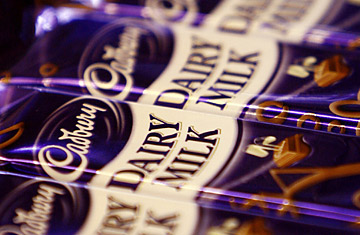
Cadbury chocolate bars
In these stomach-churning times, there's comfort to be had in chocolate. Just ask Kraft. The world's second-largest foodmaker revealed on Monday, Sept. 7, that it had launched a $16.7 billion bid for British confectioner Cadbury, a bold effort to create "a global powerhouse in snacks" worth $50 billion a year in revenues. Cadbury rejected the offer, but Kraft, maker of Oreo cookies and Kool-Aid, showed its sweet tooth. The firm is "committed to working toward a transaction," it said in a statement, "and to maintaining a constructive dialogue."
Cadbury can't be that surprised by Kraft's interest. Ever since U.S. chocolate giant Mars picked up chewing-gum maker Wrigley for $23 billion in 2008 — overtaking Cadbury to become the world's biggest confectioner in the bargain — analysts have held up the British firm as a compelling target for a firm like Kraft. Cadbury boasts around a quarter of the world's fast-growing gum market, a sector Kraft has missed out on. Its muscle in the U.K., Latin America and key emerging markets like India would also complement Kraft's strengths in the U.S. and Europe. In fact, with 15% of the global confectionary market, the company based in Northfield, Ill., would, thanks to the deal, be on a par with Mars.
The timing of Kraft's offer — initially tabled in late August but made public only Monday — makes good sense. Part way through a years-long plan to boost its margins, Cadbury has an earnings potential that looks healthy. Having spun off its troublesome drinks business in 2008, it saw its profits and margins both rise in the first half of this year. Nor is there much concern about Kraft's being able to pull off such a merger. Deals involving a large firm's acquisition of a significantly smaller one — revenues at Kraft are more than four times those of Cadbury — are "the deals that have tended to work," says Martin Deboo, an analyst at Investec Securities in London. "It makes perfect sense for Kraft to acquire Cadbury," Sanford C. Bernstein analyst Andrew Wood wrote in a note to clients Monday. "And they should do it."
That means raising its offer. Kraft's bid puts a price of 745 pence on each share, a 31% premium compared with Cadbury's closing price last Friday, Sept. 4. But analysts agree with Cadbury's assessment that Kraft's approach "fundamentally undervalues the group and its prospects." As a multiple of Cadbury's sales, for instance, Kraft's offer amounts to roughly half that tabled by Mars in its acquisition of Wrigley, says Jeremy Batstone-Carr, an analyst at brokers Charles Stanley in London. Expectation of a second bid from Kraft, a fresh one from Switzerland's Nestlé or U.S. confectioner Hershey, or even a combined approach from Kraft and one of its rivals pushed Cadbury shares 40% higher Monday.
As takeover interest in Cadbury grows — and with it, the prospect of a big payday for the chocolate maker's shareholders — pressure on the firm will mount. Should it choose to cling to its independence, investors might expect something in return. Squeezing more profits out of Cadbury, though, could mean cutting jobs. And with Kraft pledging to preserve U.K. staff as part of its offer, any such move might make Cadbury unpopular. That's left some analysts backing the Americans. Kraft, reckons Batstone-Carr, "has a better than 50% chance of success."
